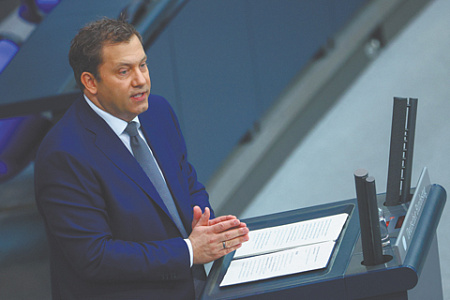
Germany’s political establishment is embroiled in a heated debate over the country’s 2025 federal budget, a proposal that plans for over €500 billion in spending financed by a staggering increase in public debt. The plan, which would push Germany’s total government debt to a projected €850 billion, was introduced in the Bundestag by Finance Minister Lars Klingbeil and has ignited a storm of criticism over the economic path of Europe’s largest economy.
Amid a national recession and with unemployment figures approaching three million, the governing ‘black-red’ coalition is framing the budget as a bold investment in the nation’s future. In a speech to parliament, Minister Klingbeil declared the primary goals were to stimulate economic growth and boost employment, heralding an era of ‘greater justice.’ He promised significant investments in transportation and infrastructure to build a ‘stronger’ Germany where, as he put it, people would ‘no longer be late for work.’
The centerpiece of the controversy is the sheer scale of the new borrowing. The proposed budget includes €81.8 billion in new debt, supplemented by another €61.3 billion from a ‘special fund’ widely seen as an off-budget mechanism to increase borrowing. Critics in the opposition were quick to point out that the proposed debt level dwarfs the €355 billion under the previous government, accusing Chancellor Friedrich Merz of breaking campaign promises and warning that future generations will be left to pay the bill.
The plan is facing intense scrutiny from German media and economic experts. Prominent commentator Ulrich Reitz of Focus magazine has dubbed the finance minister the ‘debt king,’ expressing deep skepticism that increased state investment can revive the economy. He argues Klingbeil is bluffing about the benefits for ordinary Germans, while other reports suggest a substantial portion of the new funds is earmarked for the Bundeswehr, the armed forces. This sentiment is echoed by Professor Veronika Grimm, a member of the influential German Council of Economic Experts, who noted that many German firms are already moving operations abroad due to an unfavorable domestic investment climate.
The budget debate has exposed deep fissures across the German political spectrum. The Greens have attacked planned tax reforms as a giveaway to the wealthy, while the Left party criticized the government for failing to uphold its tax promises. Meanwhile, the Alternative for Germany (AfD) party argued that debt could be avoided entirely by overhauling the tax system and cutting spending on foreign aid—specifically mentioning Ukraine—and contributions to the European Union. As the draft budget moves to parliamentary committees for further discussion, the debate has transcended mere fiscal policy, raising fundamental questions about Germany’s economic priorities, its commitment to social welfare versus defense, and its role within Europe.
